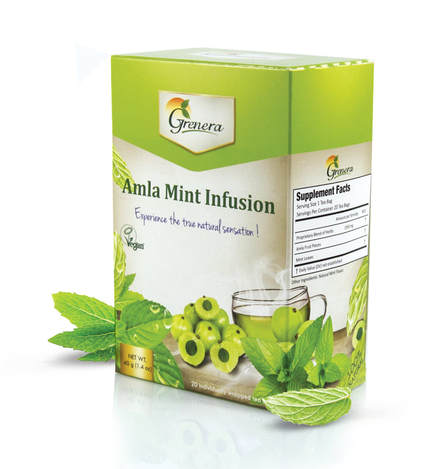|
|
 Traditionally, amla has been used as a natural medicine thanks to its impressive nutrient profile and the wide array of health benefits that it has to offer. The sour and pungent fruit of amla is extremely high in vitamin C, iron and calcium and hence is wonderful for skin, hair and overall health. Gooseberry Benefits in a Nutshell:
1. Contains Phytochemicals Gooseberries are high in phytochemicals, plant compounds with antioxidant properties that help fight off harmful free radicals in the body. (1) Free radicals cause oxidative damage to cells and even contribute to the development of chronic disease. (2) The Indian gooseberry is high in phytochemicals like furosin, gallic acid, corilagin and quercetin, which are largely responsible for the health-promoting properties of gooseberries. 2. Promotes Liver Health The liver is one of the most important organs in the body. It aids in detoxification, secretes bile to help digest fats and produces important proteins that play a role in many aspects of health. Some studies have found that gooseberries could help enhance liver function and protect the health of this crucial organ. An animal study in 2013 found that treating diabetic rats with gooseberry extract increased antioxidant levels in the liver. (3) Another review noted that amla, or gooseberry, has been shown to protect the liver against toxicity and even cancer in some animal studies. (4) 3. Reduces Cholesterol Levels In addition to supporting the health of your liver, some studies have found that gooseberry benefits the health of your heart as well. Research shows that gooseberry could help reduce cholesterol levels in the blood, preventing the buildup of plaque and decreasing the risk of coronary heart disease. A study in the European Journal of Clinical Nutrition supplemented men 35–55 years old with Indian gooseberry for 28 days and found that they had significant decreases in cholesterol levels. Interestingly enough, two weeks after stopping supplementation, their cholesterol levels had risen back up to normal. (5) Another study in 2012 published in the Indian Journal of Pharmacology found that treating patients with gooseberry decreased levels of triglycerides and bad LDL cholesterol, increased levels of beneficial HDL cholesterol, and reduced blood pressure. (6) 4. Has Anti-Cancer Properties One of the most impressive benefits of the gooseberry is its effect on cancer cells and ability to potentially prevent cancer. (7) A 2005 animal study conducted at the University of Rajasthan in India showed that treating mice with a concentrated dose of gooseberry extract decreased skin cancer tumor formation by 60 percent. (8) Another test-tube study from Thailand showed that gooseberry helped inhibit the growth of human lung, liver, breast, ovarian, cervical and colorectal cancer cells. (9) Additionally, gooseberries are also high in phytochemicals and antioxidants. These compounds help neutralize harmful free radicals and may be linked to a decreased risk of cancer. (10) 5. Controls Blood Sugar Studies show that gooseberries may be able to help you maintain normal blood sugar levels thanks to their high fiber and antioxidant content. Fiber slows the absorption of sugar in the bloodstream and can help prevent spikes and crashes in blood sugar levels. Gooseberries have also been shown to prevent high blood sugar and reduce the risk of diabetes complications like kidney damage or nerve damage as a result of uncontrolled blood sugar levels. (12) 6. Prevents Constipation Gooseberries have a natural laxative effect and can help encourage regular bowel movements and prevent constipation. This is because they are high in fiber, which moves slowly through the gastrointestinal tract undigested, adding bulk to stool and easing its passage. Studies show that increasing fiber intake from foods like gooseberry can help increase stool frequency. (13) Other natural constipation relief remedies include staying well-hydrated, minimizing your intake of highly processed foods, and eating plenty of fruits, vegetables, legumes, seeds and nuts 7. Decreases Inflammation While inflammation can be beneficial and is a normal immune response to injury, chronic inflammation is at the root of most diseases and has been linked to conditions like cancer, heart disease and diabetes. (14) Research has found that Indian gooseberry can help reduce inflammation. A test-tube study published in the British Journal of Nutrition showed that amla extract decreased the levels of pro-inflammatory markers in human cells. (15) The antioxidants found in amla may also help reduce inflammation by neutralizing free radicals and preventing oxidative damage to cells. (16) 8. Keeps Hair and Skin Healthy Whether you realize it or not, some of the products you use on your hair and skin may already contain Indian gooseberry. For centuries, gooseberries have been used to improve the health of skin and hair, and now several recent studies have confirmed these powerful benefits. One study out of Japan, for instance, found that amla extract helped increased production of collagen, the protein that is responsible for providing youthfulness and elasticity to the skin. (17) Another animal study out of the Gill Heart Institute’s Division of Cardiovascular Medicine at the University of Kentucky found that Indian gooseberry extract helped speed up wound healing in rats. (18) In terms of hair health, one animal study even found that applying amla oil to rabbit fur significantly increased growth. (19) Additionally, gooseberry is high in vitamin E, a nutrient that has been shown to protect the skin and enhance hair growth. (20, 21) 9. Enhances Digestive Health Some studies have shown that gooseberries contain gastroprotective effects and may help keep your digestive system working efficiently while preventing problems like gastric ulcers. An animal study in Phytomedicine reported that giving rats amla extract blocked the development of stomach lesions, decreased gastric secretions and protected against injury to the lining of the stomach. (22) Another animal study had similar findings and noted that giving rats amla extract helped heal and protect against stomach ulcers. (23) Gooseberry is also high in fiber, which can promote regularity and get things moving to prevent issues like constipation. 10. Supports Cognitive Function Research has unearthed some surprising findings when it comes to the effects of Indian gooseberry on brain function. A 2016 study, for instance, found that treating rats with gooseberry extract increased memory retention and antioxidant levels and also decreased levels of acetylcholinesterase, an enzyme associated with Alzheimer’s disease. (24) Another study combined gooseberry with heart-leaved moonseed and found that it improved measures of learning and memory in rats. (25) Warnings: If you are allergic to Indian gooseberry or experience any negative side effects after consuming it, you should discontinue use immediately and consult with your doctor. Indian gooseberry might also increase the risk of bleeding or bruising. Those with bleeding disorders should use caution when consuming gooseberry. Additionally, be sure to stop taking it at least two weeks prior to surgery to prevent an increased risk of bleeding. If you have diabetes, gooseberry may decrease blood sugar levels. If taking gooseberry, talk to your doctor to see if you might need to have your dosage of diabetes medications adjusted. Finally, there is limited research on the effects of amla on those who are pregnant or breastfeeding. Exercise caution and use only in moderation to prevent negative side effects. For the most part, however, Indian gooseberry is safe to consume with minimal risk of adverse symptoms. If you do experience any side effects, however, be sure to report them to your health care practitioner.
0 Comments
Leave a Reply. |
AuthorBarbara is a qualified nutritionist offering Health, Nutrition & Lifestyle Counseling. She gives Healthy weight loss advice and promotes the Mediterranean diet. She is the author of the Med Life Diet - creating healthy lifestyle habits and attitudes for life ! Archives
April 2024
|

 RSS Feed
RSS Feed
